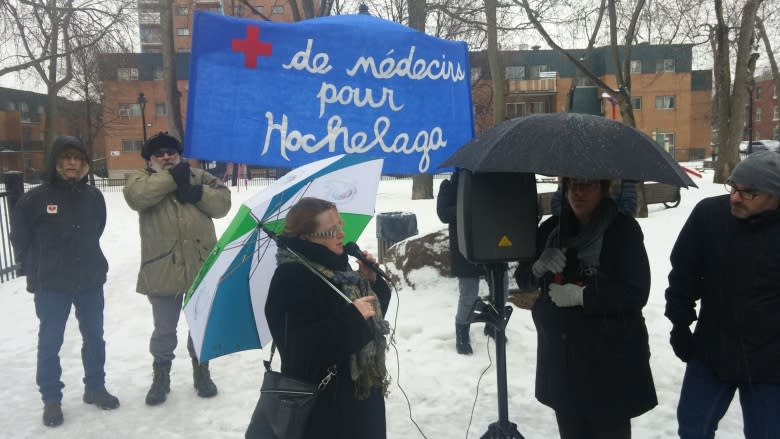Shortage of family doctors leaves Hochelaga-Maisonneuve residents in the lurch
Montreal's Hochelaga-Maisonneuve neighbourhood is in dire need of family doctors as local clinics struggle to attract and retain general practitioners in the area.
Dr. André Dufour, who works at the CLSC on Ontario Street East, says the community clinic is scrambling to provide medical services to residents amid the growing shortage.
"It's a problem of attrition, of the aging of doctors who have worked here for several years and not replacing them," he told Radio-Canada.
Parti Québécois MNA Carole Poirier said there are only four family doctors to serve 56,000 residents — and only two of them currently take on walk-in patients.
"We call this a medical desert," she said.
Five rallies have been organized in Hochelaga-Maisonneuve to shed light on the issue, including one this Sunday. But Poirier admits the situation hasn't improved.
Without local family doctors, many patients are forced to seek medical attention elsewhere, but that shouldn't be the case, said Dufour.
"It's difficult to ask people who are old and don't have a lot of financial resources once they are sick to travel at six or seven in the morning to try their luck in Rosemont," he said.
"To get in a car that they don't have or a taxi they don't have the money for to get there to see if maybe they will be seen. That's a huge scandal."
Why is it so hard to attract doctors?
For patients like Diane Godbout, the shortage leaves her in the care of a handful of different doctors when she needs medical attention. She had a general practitioner, but he retired.
"Doctors don't know us," she said. "They don't know our file. They know nothing."
While Dufour recently called on family doctors to work in the struggling neighbourhood, only a few general practitioners responded.
With the help of three doctors, Dufour said they will now be able to provide a half-day of a walk-in clinic each month as of May.
"It's a start," he said.
General practitioners aren't interested in working in the neighbourhood because they want to work at hospitals or superclinics, according to both Dufour and Poirier.
Superclinics are open longer and pool together more resources in the same place. Many of them offer blood testing, diagnostic imaging and other specialty services either on the spot or nearby.
"We built a CLSC and we have no doctors in our CLSC, because there's no radiology clinics, because there are no related services," said Poirier.
The provincial government announced the opening of two new superclinics in Montreal earlier this month — but Hochelaga still won't have one.
While Health Minister Gaétan Barrette told Radio-Canada the area is a priority for the province, he can't force Montreal-based general practitioners to specifically practice in Hochelaga-Maisonneuve.
But there is still hope that ongoing community efforts will help draw doctors who want to make a difference in their field.
"It depends on why they chose medicine, is it to be useful? If it's to be useful then we go where people need us. It's as simple as that," said Dufour.



